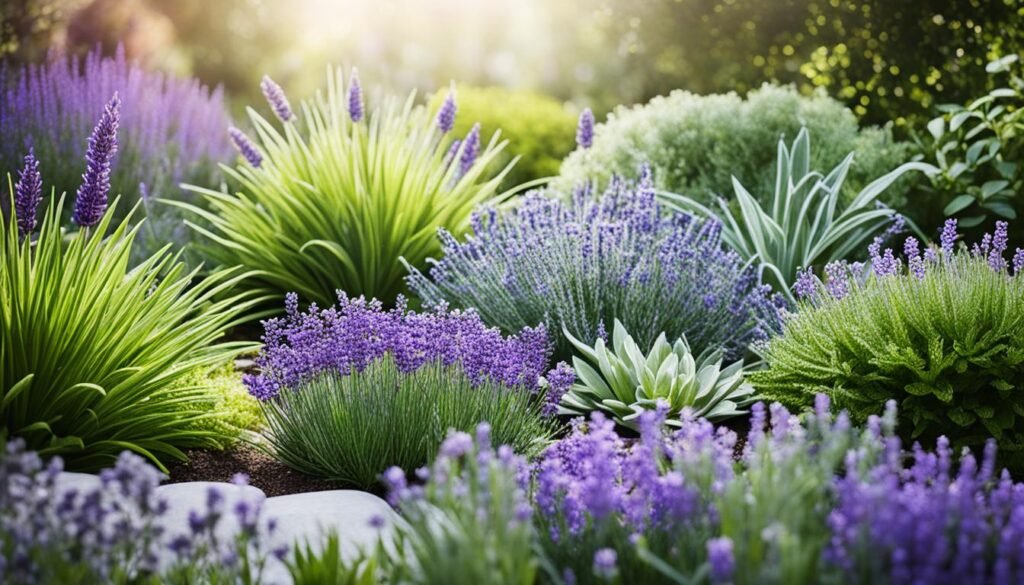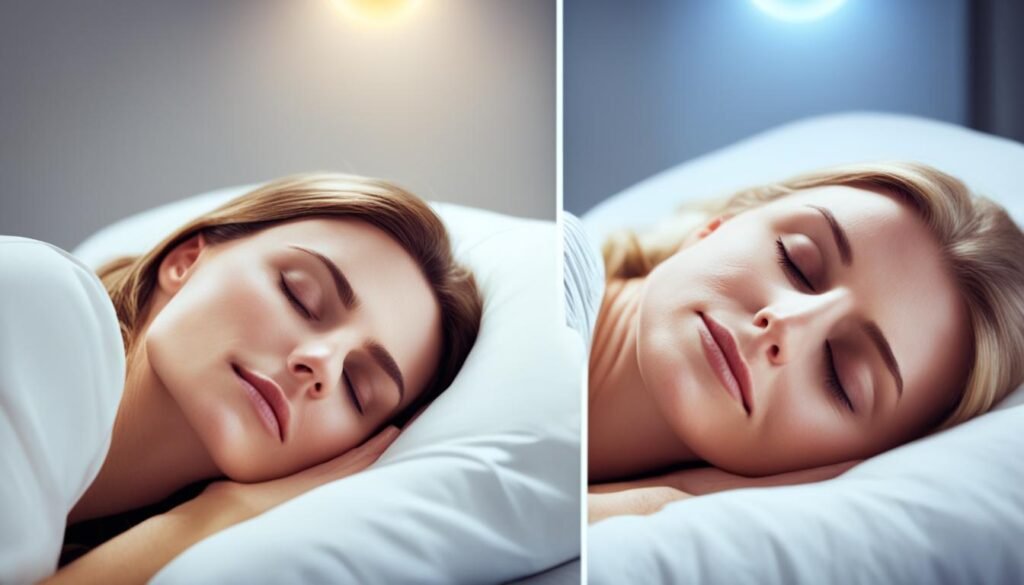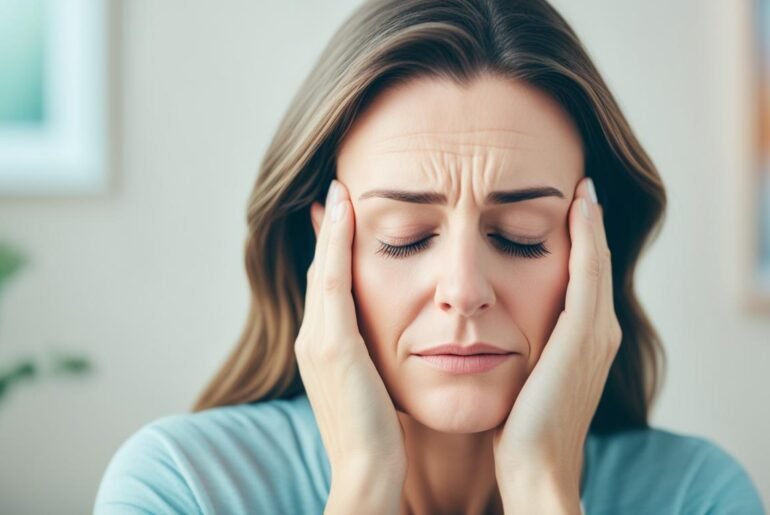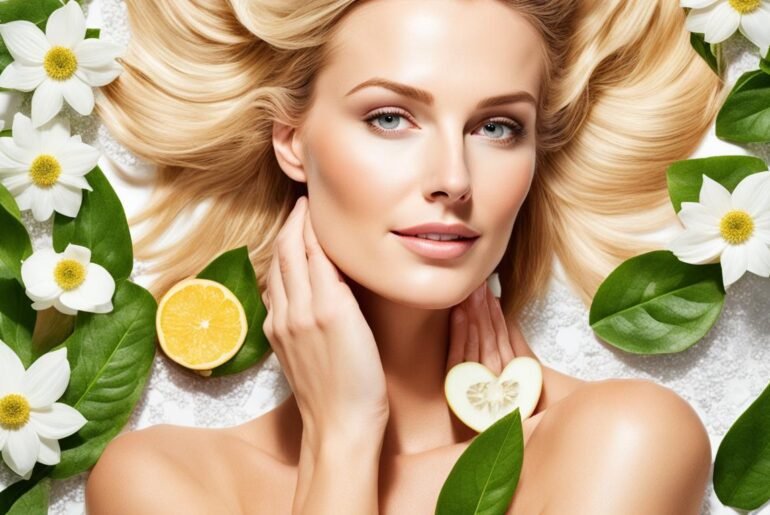Did you know that a high-stress lifestyle can make you look up to 3.5 years older? Stress-induced aging is a real concern that can have noticeable effects on the skin. Clinical studies have shown that stress hormones like cortisol can cause dehydration, sallowness, roughness, and deep expression lines on the skin. Thankfully, there are lifestyle changes you can make to combat stress skin aging and promote a more youthful appearance.
Key Takeaways:
- Combat stress skin aging by managing stress effectively.
- Adopt a holistic approach to skincare by addressing external and internal factors.
- Practice stress reduction techniques like mindfulness and deep breathing.
- Incorporate regular exercise to increase blood flow and promote healthier skin.
- Nourish your body with a healthy diet and stay hydrated for better skin health.
Understanding the Impact of Stress on Skin Aging
Stress-induced aging is a real concern that can have noticeable effects on the skin. The constant flood of stress hormones like cortisol can lead to various skin issues, including dehydration, sallowness, roughness, and deep expression lines. To combat the effects of stress on the skin, it’s essential to understand the causes of stress-induced aging and take proactive steps in addressing them.
Stress-induced aging occurs due to the continuous release of cortisol, a hormone produced in response to stress. Cortisol can disrupt the skin’s natural balance and affect its health and appearance. High levels of cortisol fatigue our bodies, leading to a depletion of essential nutrients and impairing the skin’s ability to repair and renew itself. This can result in dullness, dryness, and the development of wrinkles and fine lines.
Furthermore, cortisol can decrease the production of collagen and elastin, two proteins that help maintain the skin’s firmness and elasticity. As a result, the skin may become lax, saggy, and prone to developing deep expression lines. The skin’s barrier function can also be compromised by stress, leading to increased sensitivity, redness, and inflammation.
Understanding the impact of stress on skin aging is the first step in combating its effects. By recognizing the causes of stress-induced aging, we can adopt strategies to minimize stress and protect our skin’s health and vitality.
“Stress is a significant factor in the aging process of the skin. By understanding its causes, we can take proactive steps in combating stress-induced aging and maintaining a healthy complexion.” – [Real Name], Dermatologist
The Causes of Stress Skin Aging
Several factors contribute to stress skin aging, including:
- Environmental Factors: Exposure to environmental stressors like pollution, harsh weather conditions, and UV radiation can exacerbate the effects of stress on the skin. These external stressors can further dehydrate the skin, promote oxidative stress, and accelerate the aging process.
- Lifestyle Habits: Unhealthy lifestyle habits, such as poor diet, lack of exercise, inadequate sleep, and excessive alcohol and tobacco consumption, can increase stress levels and negatively impact skin health. These habits can lead to imbalances in the body and compromise the skin’s ability to function optimally.
- Emotional and Psychological Stress: Emotional and psychological stressors, such as work pressures, relationship problems, and financial worries, can trigger the release of stress hormones and contribute to stress-induced aging. The mind-body connection plays a significant role in overall well-being, including skin health.
By addressing these causes and implementing stress management techniques, we can minimize the impact of stress on the skin and promote a more youthful complexion.
| Causes of Stress Skin Aging | Effects on the Skin |
|---|---|
| Environmental Factors | – Dehydration – Oxidative stress – Accelerated aging |
| Lifestyle Habits | – Imbalances in the body – Impaired skin function – Reduced skin vitality |
| Emotional and Psychological Stress | – Increased release of stress hormones – Impaired skin health – Premature aging |
The Role of Lifestyle Changes in Skin Health

Lifestyle changes are key to maintaining skin health and combating stress-related aging. Taking a holistic approach to skincare means addressing both external and internal factors. By adopting stress reduction techniques and incorporating healthy habits into our daily routine, we can improve overall well-being and promote healthier, more youthful-looking skin.
When it comes to skincare, it’s not just about what we put on our skin but also what we do to support it from within. Lifestyle changes such as reducing stress levels can have a profound impact on our skin’s health and appearance.
“The greatest wealth is health.” – Virgil
Stress reduction is a vital component of a holistic approach to skincare. High levels of stress can disrupt the skin’s barrier function, leading to inflammation, dryness, and accelerated aging. By incorporating stress reduction techniques into our daily lives, we can help restore balance and promote skin health.
Healthy Lifestyle Habits for Skin Health
Here are some lifestyle changes that can contribute to better skin health:
- Manage Stress: High levels of stress can impact both our mental and physical well-being. Practice stress reduction techniques such as mindfulness, meditation, deep breathing exercises, and engaging in activities that bring joy and relaxation.
- Get Adequate Sleep: Quality sleep is essential for skin repair and rejuvenation. Establish a consistent sleep routine and create a relaxing sleep environment to promote better sleep quality.
- Adopt a Balanced Diet: Nourish your body with nutrient-dense foods such as fruits, vegetables, whole grains, and lean proteins. These foods provide essential vitamins, minerals, and antioxidants that promote skin health.
- Stay Hydrated: Drink plenty of water and consume water-rich foods and beverages to keep your skin hydrated from within. Hydration is crucial for maintaining skin elasticity and a healthy complexion.
By making these lifestyle changes, we not only improve our skin’s health but also enhance our overall well-being. Remember, skincare is a journey, and small changes can make a big difference in the long run. Take a proactive approach to skincare and embrace a holistic lifestyle that nourishes your body and reduces stress.
| Lifestyle Changes | Benefits for Skin Health |
|---|---|
| Stress reduction techniques | Help restore skin’s barrier function and reduce inflammation |
| Adequate sleep | Promotes skin repair and rejuvenation |
| Healthy diet | Provides essential nutrients for skin health and protection against oxidative stress |
| Hydration | Maintains skin elasticity and a healthy complexion |
By incorporating these lifestyle changes into your daily routine, you can take a proactive approach to skincare and promote healthier, more radiant skin.
Be Kind to Your Mind
When it comes to combatting stress skin aging, being kind to your mind is crucial. Incorporating stress relief techniques can help alleviate stress and promote a calmer state of mind, indirectly contributing to healthier and more radiant skin. By prioritizing mental well-being and engaging in activities that bring joy and relaxation, you can take proactive steps towards achieving a youthful complexion.
Mindfulness
Mindfulness is a stress reduction technique that involves focusing your attention on the present moment. By practicing mindfulness, you can cultivate a greater sense of awareness and reduce anxiety and stress. This technique can be easily incorporated into your daily routine, whether through guided meditations, mindful walking, or simply taking a few moments to pause and pay attention to your breathing.
Meditation
Meditation is a powerful tool for calming the mind and alleviating stress. By setting aside dedicated time for meditation, you can cultivate a sense of inner peace and improve your overall well-being. Find a quiet space, sit comfortably, and focus on your breath or a specific meditation practice. With regular practice, meditation can help reduce stress levels and promote a more serene state of mind.
Deep Breathing Exercises
Deep breathing exercises are simple yet effective techniques for relaxing the body and mind. By taking slow, deep breaths and fully exhaling, you can activate the body’s natural relaxation response and reduce stress. Incorporate deep breathing exercises into your daily routine, whether it’s in the morning to start your day on a calm note or in the evening to unwind and prepare for restful sleep.
Remember, the key to combatting stress skin aging is to prioritize your mental well-being. By incorporating stress relief techniques like mindfulness, meditation, and deep breathing exercises, you can create a positive impact on your overall well-being and promote healthier, more radiant skin.
Activities that Bring Joy and Relaxation
Engaging in activities that bring joy and relaxation is an essential part of combatting stress skin aging. Find hobbies or pursuits that you enjoy, whether it’s reading, painting, gardening, or spending time in nature. These activities can provide a much-needed break from daily stressors, allowing you to recharge and rejuvenate your mind and body.
By incorporating stress relief techniques, mindfulness, meditation, deep breathing exercises, and engaging in activities that bring joy and relaxation, you can create a harmonious balance between your mind and skin. Remember, a calm and centered state of mind indirectly contributes to healthier and more radiant skin.
Move Your Body

Regular exercise and physical activity can have a significant impact on both our overall health and the health of our skin. Exercise not only helps us stay fit and maintain a healthy weight but also plays a crucial role in promoting skin health.
When we exercise, our heart rate increases, and blood circulation improves throughout the body, including the skin. This increased blood flow delivers essential oxygen and nutrients to the skin cells, while at the same time removing waste products. As a result, exercise promotes a more vibrant, youthful appearance.
Furthermore, engaging in physical activity can also help reduce stress levels. Exercise triggers the release of endorphins, which are known as “feel-good” hormones. These endorphins help in reducing stress and boosting our mood, thereby indirectly benefiting our skin health by reducing stress-driven skin issues.
It’s important to find an exercise routine or activity that you enjoy, as this will make it easier to stick to and incorporate into your daily life. Whether it’s going for a jog, taking a yoga class, playing a sport, or simply going for a brisk walk, find what brings you joy and make it a regular part of your routine.
The Benefits of Exercise for Skin Health:
- Increased blood flow leading to improved delivery of oxygen and nutrients to the skin cells
- Removal of waste products that can contribute to dullness and blemishes
- Promotion of a more youthful, radiant complexion
- Stress reduction and improved mood
Remember, consistency is key when it comes to exercise and reaping its benefits for both your overall health and skin. Aim for at least 30 minutes of moderate-intensity exercise most days of the week, and gradually increase the duration or intensity as your fitness level improves.
Physical fitness is not only one of the most important keys to a healthy body, but it is also the basis of dynamic and creative intellectual activity. – John F. Kennedy
So, lace up your sneakers, get moving, and enjoy the positive effects exercise can have on your skin health and overall well-being.
Nourish Your Body from Within
Nourishing the body with a healthy, balanced diet is crucial for maintaining skin health and combating stress skin aging.
Incorporating nutrient-dense foods rich in vitamins, minerals, and antioxidants can help protect the skin from cellular damage and oxidative stress. These foods provide essential nutrients that promote skin health and vitality.
A diet rich in fruits and vegetables, whole grains, lean proteins, and healthy fats can provide the necessary building blocks for healthy skin.
Here are some nutrient-dense foods that support skin health:
- Dark leafy greens: Spinach, kale, and Swiss chard are packed with vitamins A, C, and E, as well as antioxidants.
- Fatty fish: Salmon, mackerel, and sardines are excellent sources of omega-3 fatty acids, which promote skin elasticity and hydration.
- Colorful fruits and vegetables: Berries, carrots, sweet potatoes, and bell peppers contain antioxidants that protect the skin from free radicals.
- Nuts and seeds: Almonds, walnuts, flaxseeds, and chia seeds provide essential fatty acids and antioxidants for healthy, glowing skin.
- Whole grains: Quinoa, brown rice, and oats are rich in vitamins and minerals that support skin health.
In addition to consuming nutrient-dense foods, staying hydrated is crucial for healthy skin. Drink plenty of water throughout the day and include hydrating foods like cucumbers, watermelon, and oranges in your diet. Adequate hydration helps maintain the skin’s moisture balance and promotes a smoother complexion.
By nourishing your body with a variety of nutrient-dense foods and staying hydrated, you can support your skin’s health from within. A balanced diet and hydration are essential components of a holistic approach to skincare.
“The food you eat can be either the safest and most powerful form of medicine or the slowest form of poison.” – Ann Wigmore
Skincare for Stress Skin Aging

When it comes to addressing stress skin aging, a well-rounded skincare routine can be beneficial. By incorporating stress-reducing ingredients, hydrating agents, and powerful anti-aging compounds, you can effectively combat the visible signs of stress on your skin.
Stress-Reducing Skincare Ingredients
One key ingredient to look for in stress-reducing skincare products is neuropeptides. Neuropeptides target visible skin wrinkling caused by repetitive facial expressions, helping to smooth fine lines and restore a more youthful appearance.
“Neuropeptides are a game-changer in reducing the effects of stress on the skin. They work by relaxing the facial muscles, reducing the appearance of expression lines and wrinkles,” says Dr. Michelle Carter, a renowned dermatologist.
Another ingredient that can help soothe stressed skin is wild indigo extract. Known for its skin-calming properties, wild indigo can reduce redness, inflammation, and sensitivity caused by stress. Incorporating products with wild indigo can help restore balance and improve overall skin health.
Hydrating Ingredients for Combatting Dehydration
Stress can often lead to dehydration, resulting in dry, dull, and tired-looking skin. To combat this, it’s important to include hydrating ingredients in your skincare routine.
Hyaluronic acid is a powerful humectant that attracts and retains moisture in the skin. By incorporating hyaluronic acid into your skincare products, you can promote hydration and plumpness, giving your skin a healthy and refreshed appearance.
Retinol for Cell Renewal
A highly recommended ingredient for addressing stress skin aging is retinol. Derived from vitamin A, retinol has been proven to accelerate cell renewal and improve the appearance of fine lines, wrinkles, and texture.
“Retinol is a gold standard ingredient for anti-aging skincare. It helps boost collagen production, smooth out wrinkles, and improve overall skin tone,” explains Dr. Jennifer Lee, a board-certified dermatologist.
To incorporate retinol into your routine, look for serums or creams containing this potent ingredient. Start with a lower concentration and gradually increase as your skin adjusts to avoid any potential irritation.
By incorporating stress-reducing skincare ingredients, such as neuropeptides, wild indigo extract, hyaluronic acid, and retinol, into your routine, you can effectively combat the visible signs of stress on your skin. These ingredients work synergistically to promote a more youthful, glowing complexion, helping you maintain your skin’s health and vitality.
Sun Protection and Anti-Aging

In order to combat premature aging caused by stress and other factors, it is crucial to protect the skin from sun damage. Prolonged sun exposure can lead to the development of wrinkles, age spots, and even skin cancer. By practicing safe sun habits and incorporating effective sun protection measures into your skincare routine, you can minimize the negative effects of the sun on your skin.
One of the key sun protection tips is to always wear sunscreen with a minimum Sun Protection Factor (SPF) of 30. The SPF rating indicates the level of protection against harmful ultraviolet (UV) rays. Opting for a broad-spectrum sunscreen is essential, as it provides protection against both UVA and UVB rays. UVA rays penetrate the skin deeply and contribute to premature aging, while UVB rays primarily cause sunburn.
In addition to sunscreen, consider wearing protective clothing that covers exposed skin, such as long-sleeved shirts and wide-brimmed hats. This physical barrier provides an extra layer of defense against the sun’s harmful rays.
Recommended Sun Protection Tips:
- Apply sunscreen generously to all exposed areas of the skin, including the face, neck, arms, and legs.
- Reapply sunscreen every two hours, or more frequently if sweating or swimming.
- Seek shade during peak sun hours, typically between 10 a.m. and 4 p.m., when the sun’s rays are strongest.
- Protect your lips with a lip balm that contains SPF.
- Wear sunglasses that offer 100% UV protection to shield your eyes from harmful rays.
By following these sun protection tips and incorporating them into your daily skincare routine, you can effectively combat the signs of premature aging caused by sun damage. Remember, protecting your skin from the sun is not only essential for anti-aging purposes but also for maintaining overall skin health.
| UV Protection Level | SPF Range | Recommended Use |
|---|---|---|
| Low | 4-10 | Indoor activities |
| Medium | 15-29 | Everyday outdoor activities |
| High | 30-50 | Extended outdoor activities |
| Very High | 50+ | Intense and prolonged outdoor activities |
Sleep and Skin Health

Getting enough quality sleep is essential for overall health and skin rejuvenation. During sleep, our bodies undergo a process of repair and regeneration, including the cells in the skin. Lack of adequate sleep can accelerate the aging process and contribute to the development of wrinkles, dark circles, and dullness. To promote skin health and combat stress-induced aging, it is crucial to prioritize sleep and establish healthy sleep habits.
To optimize sleep quality and promote skin repair, consider the following:
- Create a Consistent Sleep Routine: Going to bed and waking up at the same time every day can help regulate your body’s internal clock, improving the quality of your sleep.
- Create a Relaxing Sleep Environment: Ensure that your sleep environment is conducive to relaxation. Use blackout curtains, earplugs, or a white noise machine to minimize disruptions. Keep the room cool, dark, and comfortable.
- Practice Good Sleep Hygiene: Adopting good sleep hygiene practices can enhance the quality of your sleep. Avoid caffeine and electronics close to bedtime. Establish a wind-down routine that includes relaxing activities like reading or taking a warm bath.
Adequate sleep is vital for skin repair and rejuvenation. Lack of sleep can lead to various skin issues, including:
| Skin Issues Caused by Lack of Sleep | Description |
|---|---|
| Wrinkles | Insufficient sleep can weaken collagen production, leading to the formation of fine lines and wrinkles. |
| Dark Circles | Lack of sleep can cause blood vessels under the eyes to dilate, resulting in dark circles and a tired appearance. |
| Dullness | Sleep deprivation can affect the skin’s natural glow, making it appear dull and lifeless. |
By prioritizing sleep and taking steps to improve sleep quality, you can support skin repair processes and maintain a healthier, more youthful complexion.
Stress Reduction Techniques for Skin Health

Practicing stress reduction techniques is vital for maintaining skin health and combatting the effects of stress-induced aging. Incorporating activities like meditation, deep breathing exercises, self-care practices, and engaging in hobbies or activities that promote relaxation and joy can help alleviate stress and improve overall well-being. By reducing stress levels, we can create a positive impact on our skin health.
Meditation is a powerful stress relief method that can promote a sense of calm and relaxation. Taking a few minutes each day to sit quietly, focus on your breath, and clear your mind can help reduce stress hormones and enhance skin health.
Deep breathing exercises are another effective way to combat stress and rejuvenate the skin. By taking slow, deep breaths, you can activate the body’s relaxation response, lower cortisol levels, and increase oxygen flow to the skin.
Engaging in self-care practices is essential for both mental well-being and skin health. Taking time to prioritize self-care activities such as indulging in a warm bath, pampering your skin with nourishing masks or creams, or enjoying a favorite hobby can help reduce stress and promote a healthy, glowing complexion.
Remember, self-care is not selfish—it is a necessary practice for maintaining skin health and overall well-being.
By incorporating stress reduction techniques into our daily routine, we can effectively manage stress levels and protect our skin from the damaging effects of chronic stress. Prioritizing self-care and adopting these stress relief methods can lead to healthier, more radiant skin.
The Benefits of Stress Reduction Techniques for Skin Health
Reduced stress levels can have a significant impact on skin health. When we are stressed, our bodies release cortisol, a stress hormone that can lead to inflammation, breakouts, and accelerated aging. By practicing stress reduction techniques like meditation and deep breathing exercises, we can lower cortisol levels and minimize these negative effects on the skin.
Incorporating self-care practices and engaging in activities that bring us joy can also have a positive impact on our skin. When we prioritize self-care, we reduce stress and promote a sense of well-being, which can translate to healthier, more vibrant skin.
Expert Tip: Finding the Right Stress Relief Methods
Not all stress relief methods work for everyone. It’s important to find the techniques that resonate with you and fit your lifestyle. Experiment with different practices like yoga, mindfulness, or journaling to discover what helps you relax and reduce stress.
Remember, finding balance in your life is key to maintaining both mental and physical health.
The Importance of Regular Dermatologist Check-ups
Regular check-ups with a dermatologist are crucial for maintaining healthy skin and preventing skin cancer. These appointments allow dermatologists to closely examine your skin, identifying any suspicious moles, growths, or changes that may indicate skin cancer or other skin conditions.
Early detection plays a significant role in successful treatment and overall prognosis. By prioritizing regular check-ups and following the recommendations of a dermatologist, I can take proactive measures in maintaining my skin health.
During a dermatologist check-up, the doctor will perform a thorough examination of your skin, looking for any signs of skin cancer or other issues. They may use a dermatoscope, a handheld device with magnification and a light source, to examine moles and other lesions in more detail.
If the dermatologist identifies any concerning findings, they may recommend further tests or perform a biopsy to determine if the growth is cancerous. Early detection of skin cancer allows for timely intervention and increases the chances of successful treatment.
A dermatologist check-up also provides an opportunity for me to discuss any concerns or questions I may have about my skin or skincare routine. The dermatologist can offer personalized recommendations based on my skin type, concerns, and medical history.
By incorporating annual skin check-ups into my skincare routine, I am taking an active role in preventing skin cancer and maintaining the health of my skin. It ensures that any potential issues are caught early, increasing the likelihood of successful treatment and improving my overall prognosis.
Benefits of Regular Dermatologist Check-ups:
- Early detection of skin cancer
- Prompt diagnosis and treatment of skin conditions
- Personalized skincare recommendations
- Peace of mind knowing that my skin is being monitored by a professional
Conclusion
By adopting a holistic approach to skincare and incorporating healthy lifestyle habits, we can proactively prevent and combat the signs of stress-induced skin aging. Prioritizing stress management techniques, such as mindfulness and deep breathing exercises, can help reduce the impact of stress on our skin. Nourishing our bodies with a healthy diet, rich in nutrient-dense foods and staying hydrated, plays a crucial role in maintaining skin health. Additionally, protecting our skin from sun damage through the regular use of broad-spectrum sunscreen and seeking regular dermatologist check-ups are essential preventive measures.
Embracing a healthy lifestyle that encompasses these skincare and wellness practices can lead to a more radiant and youthful complexion. By understanding the impact of stress on skin aging and taking proactive steps to combat it, we can promote overall well-being and enjoy the benefits of healthier-looking skin. Remember, prevention is key, and a holistic approach is the foundation for maintaining skin health and achieving a more vibrant and youthful appearance.
So, start prioritizing stress reduction, nourishing your body from within, protecting your skin from sun damage, and seeking professional guidance for your skin health. By embracing healthy lifestyle habits and implementing a holistic approach to skincare, you can proactively prevent and combat stress-induced skin aging and enjoy a more youthful, glowing complexion.
FAQ
What is stress-induced aging?
Stress-induced aging refers to the visible effects of prolonged stress on the skin, such as dehydration, sallowness, roughness, and deep expression lines.
How can stress management combat skin aging?
By adopting stress reduction techniques and incorporating a healthy lifestyle, you can minimize the effects of stress on your skin and promote a more youthful appearance.
What are some anti-aging tips for combatting stress skin aging?
Some anti-aging tips include practicing stress relief techniques, exercising regularly, following a nutritious diet, using stress-reducing skincare ingredients, and protecting your skin from sun damage.
How can I adjust my lifestyle to improve skin health?
Adjusting your lifestyle involves incorporating stress reduction techniques like mindfulness and meditation, engaging in regular exercise, following a healthy diet, and adopting a well-rounded skincare routine.
What are some stress relief techniques that can help improve skin health?
Stress relief techniques include mindfulness, meditation, deep breathing exercises, and engaging in activities that promote relaxation and joy.
How does exercise contribute to skin health?
Exercise promotes increased blood flow, delivering oxygen and nutrients to the skin cells, which can improve skin appearance and combat the effects of stress.
How does a healthy diet impact skin health?
A healthy diet, rich in vitamins, minerals, and antioxidants, can protect the skin from cellular damage and promote hydration, leading to a smoother complexion.
What ingredients should I look for in skincare products for stress skin aging?
Look for ingredients like neuropeptides, wild indigo, hyaluronic acid, and retinol, as they can help reduce visible wrinkles, calm the skin, hydrate, and improve texture.
How can I protect my skin from sun damage?>
Protect your skin from sun damage by wearing sunscreen with at least SPF 30, opting for broad-spectrum protection, wearing protective clothing, and avoiding peak sun hours.
How does sleep impact skin health?
Quality sleep allows the body to repair and regenerate cells, including those in the skin, promoting skin rejuvenation and preventing the development of wrinkles and dullness.
What are some stress reduction techniques for better skin health?
Stress reduction techniques include meditation, deep breathing exercises, self-care practices, and engaging in hobbies or activities that promote relaxation and joy.
How often should I see a dermatologist for check-ups?
It is recommended to see a dermatologist annually for skin check-ups to maintain skin health, detect any potential skin issues, and prevent skin cancer.
What is the importance of a holistic approach to skincare and a healthy lifestyle?
A holistic approach addresses both external and internal factors impacting skin health, promoting overall well-being and helping to prevent and combat the signs of stress-induced aging.




